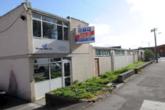 A mosque could be built in an old factory on a Bristol industrial estate despite a string of objections.
A mosque could be built in an old factory on a Bristol industrial estate despite a string of objections.
A decision by councillors is due to be made next week, nearly nine months after the plans were submitted.
The proposal, to convert the former Weston White factory in Aiken Street, Barton Hill, proved controversial when it was announced earlier this year, with extreme right-wing supporters making up part of an internet group against the application.
But despite more than 50 letters of objection, it has been recommended for approval by council officers.
The site, a former packaging factory empty since it closed in 2008, is owned by the city council.
Of the 75 letters received by the council over the plans, 14 were “judged to contain racist content” and were rejected. From the remaining letters, 50 objected and 11 were in support.
Avon and Somerset police’s Crime Reduction Unit said officers had concerns that, if built, the mosque could be targeted. It said any attacks would be “robustly and fully investigated and any such possibility should not compromise the planning decision process.”
A petition with 96 signatures has been submitted in support of the mosque, and Bristol East MP Kerry McCarthy has also written to the council giving her backing.
People against the proposals argued there are “already enough mosques in Bristol” and said it would encourage segregation of the community by catering for a specific ethnic group.
There are currently around half a dozen main mosques in Bristol; including ones in Totterdown, Kingsdown, Montpelier and two in Easton.
Some objectors said the loss of employment use was not acceptable while others called for housing on the site. Other objections included excessive noise, increased traffic and inadequate bicycle parking.
Concerns were also raised about potential conflict with the Lord Nelson pub opposite, on the grounds that “Muslims are not supposed to drink alcohol but would attend the mosque on Friday nights”.
Statements in support of the plans say the centre would benefit the community in general, help with integration and would provide a social space for Somali women.
The officer’s report recommending approval is due to be considered by the council’s development control committee next Wednesday. It states:
“The applicants say that due to the rise in the Somali population there is an urgent need for a suitable community gathering place in the Barton Hill area. The applicants also advise that it is their intention to encourage all members of the local community to make use of facilities, regardless of faith, race, age or ethnicity.”
The report argues that the community benefits would outweigh the loss of employment land and that complaints about noise would be unlikely. It states:
“It was recognised early in the consultation period by officers that the application had the potential to generate racial tension. Members are being advised that whilst community tensions may result from the proposal they are not in themselves sufficient grounds to resist the development.”
Although not mentioned in the report, more than 1,200 people joined a protest group against the mosque on the social networking site Facebook. Some of the comments posted contained offensive language, while others claimed mosques were “breeding grounds for terrorists” and called on visitors to the site to vote for the anti-immigration British National Party.
Batook Pandya, director of Bristol Support Against Racist Incidents, said he believed the centre could help with community cohesion. He said:
“When the Somali community came to Bristol they put quite a large number in Barton Hill. There were some problems at first but they have settled and they are now part of the community. If there is respect on both sides, we can co-exist.
“The biggest issue is parking. If they can assure local residents that it won’t get stupid for them to park I think it will be good. There will be a community cohesion room where we can invite schools to understand the culture.”
The chief executive of community organisation Barton Hill Settlement Joanna Holmes said: “Many people who live in Barton Hill would use a mosque, however some people are concerned about parking and noise nuisance. We are aware that a few people are against the mosque and hopefully their concerns can be dealt with.”
The applicant, Khalif Abdirahman, was not available for comment yesterday. But Hassan Naqvi, a member of the Council of Bristol Mosques, said a mosque in Barton Hill would be for the whole community, not just Muslims. Mr Naqvi said:
“We are working with the Somali community in Barton Hill to plan for this so that we can engage with the wider society and community of Bristol. This is a project in Bristol’s Muslim community to unite people. It will be open to everyone, of whatever faith. It will bring people together, not segregate them.”
Bristol Post, 2 December 2010

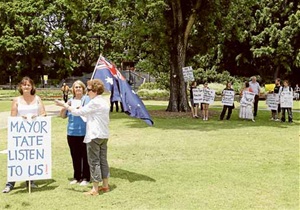 An anticipated vocal
An anticipated vocal 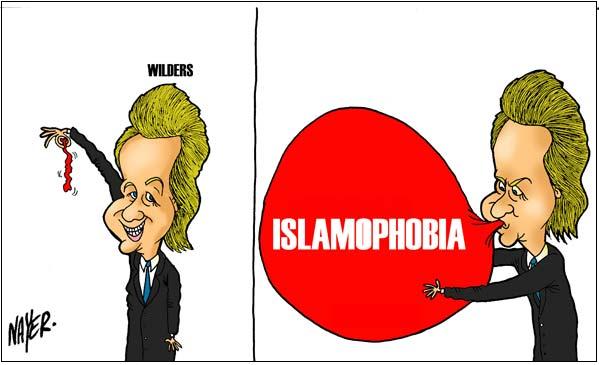
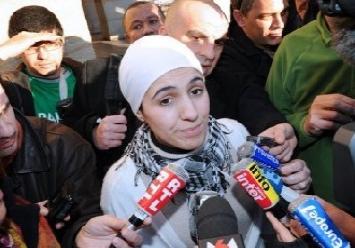 Twelve activists from Olivier Besancenot’s New Anticapitalist Party (NPA) have walked out on the party in protest.
Twelve activists from Olivier Besancenot’s New Anticapitalist Party (NPA) have walked out on the party in protest.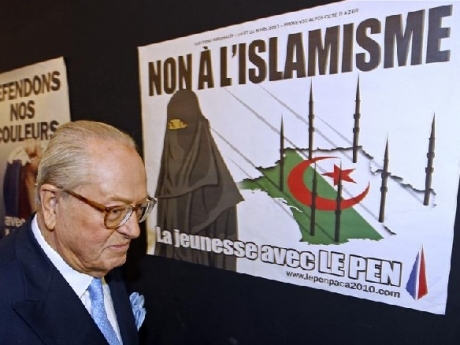 A Paris court has acquitted far-right French politician Jean-Marie Le Pen, who had faced charges of racism over campaign posters for his National Front party.
A Paris court has acquitted far-right French politician Jean-Marie Le Pen, who had faced charges of racism over campaign posters for his National Front party. A mosque could be built in an old factory on a Bristol industrial estate despite a string of objections.
A mosque could be built in an old factory on a Bristol industrial estate despite a string of objections.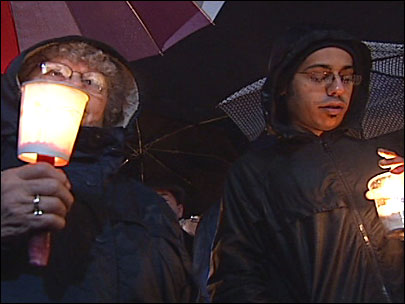 CORVALLIS, Ore. — People of all faiths surrounded a local mosque Tuesday night to stand up against an arson attack that was possibly retaliation for the foiled bomb plot in Portland last Friday.
CORVALLIS, Ore. — People of all faiths surrounded a local mosque Tuesday night to stand up against an arson attack that was possibly retaliation for the foiled bomb plot in Portland last Friday.